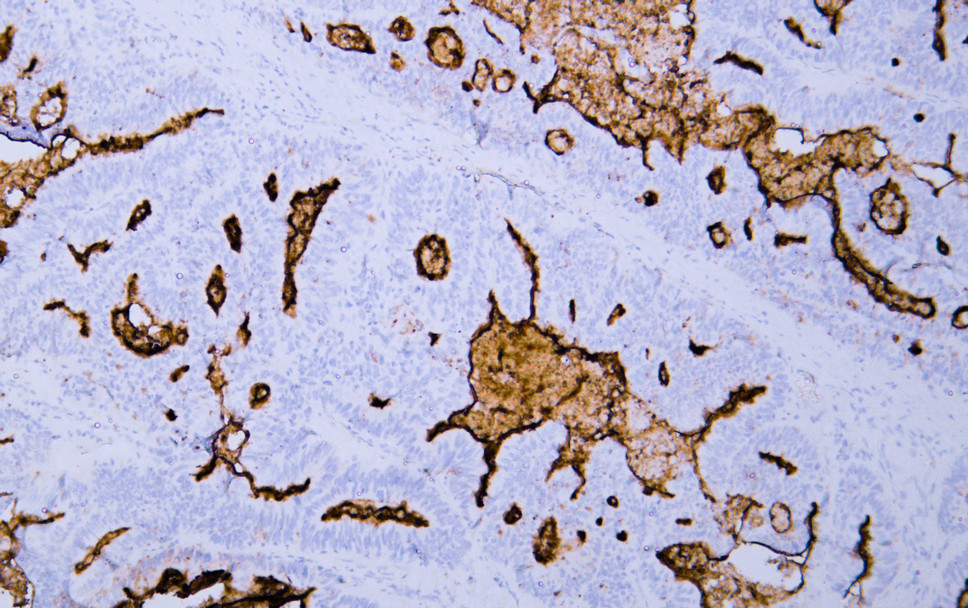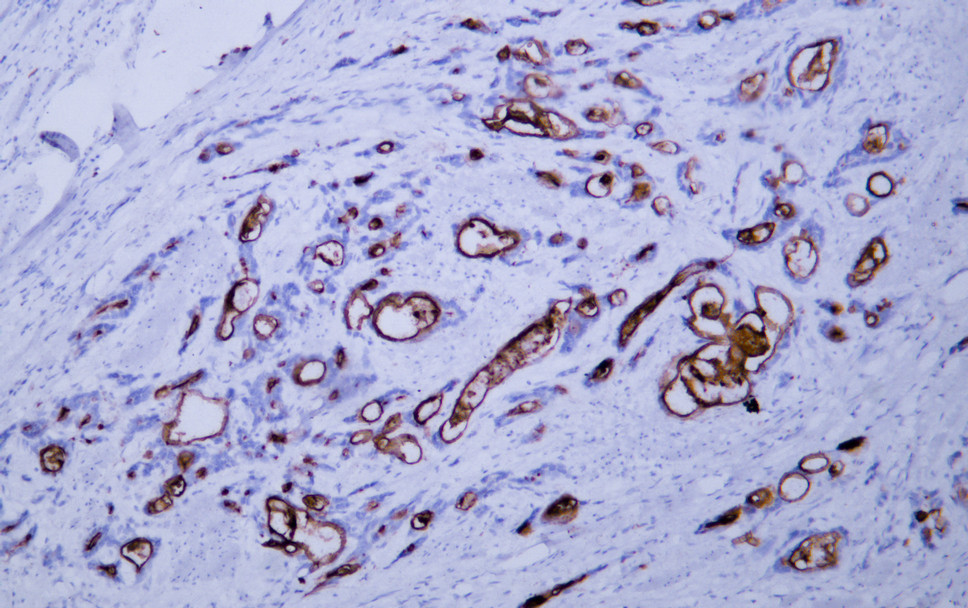MUC4 (ABT199) IHC kit
- Catalog No.:IHCM6890
- Applications:IHC
- Reactivity:Human;
- Target:
- MUC4
- Gene Name:
- MUC4
- Protein Name:
- MUC4
- Human Gene Id:
- 4585
- Human Swiss Prot No:
- Q99102
- Immunogen:
- Synthesized peptide derived from human MUC4 AA range: 2000-2100
- Specificity:
- The antibody can specifically recognize human MUC4 protein, and has no cross reaction wit MUC2, MUC5AC, MUC6 proteins.
- Source:
- Mouse, Monoclonal/IgG2a, kappa
- Purification:
- The antibody was affinity-purified from ascites by affinity-chromatography using specific immunogen.
- Storage Stability:
- 2°C to 8°C/1 year
- Other Name:
- Mucin-4 (MUC-4;Ascites sialoglycoprotein;ASGP;Pancreatic adenocarcinoma mucin;Testis mucin;Tracheobronchial mucin) [Cleaved into: Mucin-4 alpha chain (Ascites sialoglycoprotein 1;ASGP-1);Mucin-4 beta chain (Ascites sialoglycoprotein 2;ASGP-2)]
- Background:
- The major constituents of mucus, the viscous secretion that covers epithelial surfaces such as those in the trachea, colon, and cervix, are highly glycosylated proteins called mucins. These glycoproteins play important roles in the protection of the epithelial cells and have been implicated in epithelial renewal and differentiation. This gene encodes an integral membrane glycoprotein found on the cell surface, although secreted isoforms may exist. At least two dozen transcript variants of this gene have been found, although for many of them the full-length transcript has not been determined or they are found only in tumor tissues. This gene contains a region in the coding sequence which has a variable number (>100) of 48 nt tandem repeats. [provided by RefSeq, Jul 2008],
- Function:
- alternative products:Additional isoforms exist,developmental stage:Expressed early in the primitive gut before respiratory and digestive epithelial cells have acquired their tissue and cell specificity. Expressed at the basal surface of the epithelium from week 14 to 26 weeks and then predominantly localized in only parietal cells. Immediately before birth, found in the cytoplasm of the mucous columnar epithelial cells. In the embryo expressed in skin, then disappears late in gestation.,function:May play a role in tumor progression. Ability to promote tumor growth may be mainly due to repression of apoptosis as opposed to proliferation. Has anti-adhesive properties. Seems to alter cellular behavior through both anti-adhesive effects on cell-cell and cell-extracellular matrix interactions and in its ability to act as an intramembrane ligand for ERBB2. Plays an important role in cell proli
- Subcellular Location:
- Cytoplasmic
- Expression:
- Expressed in the thymus, thyroid, lung, trachea, esophagus, stomach, small intestine, colon, testis, prostate, ovary, uterus, placenta, and mammary and salivary glands. Expressed in carcinomas arising from some of these epithelia, such as lung cancers, squamous cell carcinomas of the upper aerodigestive tract, mammary carcinomas, biliary tract, colon, and cervix cancers. Minimally or not expressed in the normal pancreas or chronic pancreatitis, but is highly expressed in pancreatic tumors and pancreatic tumor cell lines.
- June 19-2018
- WESTERN IMMUNOBLOTTING PROTOCOL
- June 19-2018
- IMMUNOHISTOCHEMISTRY-PARAFFIN PROTOCOL
- June 19-2018
- IMMUNOFLUORESCENCE PROTOCOL
- September 08-2020
- FLOW-CYTOMEYRT-PROTOCOL
- May 20-2022
- Cell-Based ELISA│解您多样本WB检测之困扰
- July 13-2018
- CELL-BASED-ELISA-PROTOCOL-FOR-ACETYL-PROTEIN
- July 13-2018
- CELL-BASED-ELISA-PROTOCOL-FOR-PHOSPHO-PROTEIN
- July 13-2018
- Antibody-FAQs
- Products Images

- Human cervical squamous cell carcinoma tissue was stained with Anti-MUC4 (ABT199) Antibody

- Human colon carcinoma tissue was stained with Anti-MUC4 (ABT199) Antibody

- Human gastric adenocarcinoma tissue was stained with Anti-MUC4 (ABT199) Antibody



